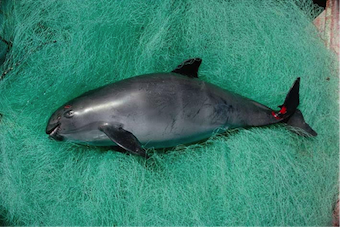The vaquita porpoise is barely clinging to existence in the northern Gulf of California, Mexico – its only home. A committee of conservation scientists concluded in a report published in 2020 that there are perhaps as few as ten left alive. To compound the tragedy this, the world’s smallest species of cetacean, is being driven to near certain extinction because of trivialities we humans have chosen to prioritize. A sacrifice to the mundane.
The vaquita are dying as incidental bycatch in gillnets, mostly set for totoaba fish (another endangered species). The totoaba’s swim bladder is in extraordinarily high demand, especially on the black markets of Asia, where it is a coveted aphrodisiac, or sold for its supposed curative properties, for ailments ranging from liver disease to arthritis. Fishing vessels catch them with what are now illegal gill nets, hanging curtains of netting in which the vaquita can become entangled. As a result, this tiny porpoise has now retreated into the southwestern corner of its refuge, where it faces a dismal future.
So let’s briefly review the timeline, and contemplate what we’ve done.
Two decades ago the vaquita was already in very serious trouble, with a total population of only around 600. A 2015 survey estimated it was down to about 60 individuals. By 2017, when the Mexican government started taking the situation seriously and announced a permanent ban on gillnets in the vaquita’s range, the population was estimated at less than 30. The gillnet ban is obviously essential for the vaquita to survive in its natural habitat, and scientists and conservation organizations had been requesting it for many years. But it hasn’t been nearly enough, and the vaquita are still dying in illegal gillnets. So today there are about ten.
What will it take to save them at this point?
The International Committee for the Recovery of the Vaquita (CIRVA) advises the Mexican government on actions required to save the species. They urge ministers to immediately fund and expand efforts to remove nets, protect the net removal teams, step up surveillance, and arrest anyone fishing illegally. The reason for this more forceful action? Those who persist in the use of gill nets have proven themselves dangerous and prepared to use violence against those trying to protect the animals. For example, Sea Shepherd’s ships are sometimes attacked while patrolling the vaquita’s marine protected area.
As well, we need to see more international cooperation to develop “vaquita-safe” fishing methods. As a follow up to CIRVA recommendations, Mexico’s National Institute of Fisheries (INAPESCA) and WWF Mexico established an international committee of experts to develop and urgently implement these safe fishing technologies. These will include protocols and guidelines for the small trawl to catch shrimp, and traps and other gear for fish, meant to substitute for gillnets. The committee is comprised of experts from universities and marine research institutes from a number of countries including the U.S., Sweden, Canada, Denmark and others.
WWF has helped study vaquitas and worked with the Mexican government and local partners to implement protective measures, and to develop a long-term strategy for the conservation of the species. They’ve also asked the U.S. and China to provide enforcement support to help stamp out the illegal trade in totoaba products.
If we fail in any of these urgent and difficult measures, the vaquita will very soon cease to exist. We are now down to the need for ultra-heroic actions to undo the effects of having behaved very stupidly.
So having considered this case, especially given how long we waited before we deemed the situation urgent, one has to wonder whether we, as a species, are up to the task of saving ourselves. The situation is that there are many more people than there are vaquitas, or most any other vertebrate species. All the force of law and notable conservation efforts lined up on one side seem to be considerably outmatched by forces on the other side. In case after case, with the vaquita being only one, profit-driven activities will result when fuelled by huge demand – be it for totoaba swim bladders, rhino horns or tiger bones – no matter how scientifically invalid and destructive. All it takes is a tiny percentage of the 8 billion of us to believe nonsense, and nature doesn’t seem to stand a chance.
At the very least, even if we do manage to save ourselves as the demands of our growing population collide with the needs of the natural world, we can be sure that we will suffer some significant and staggering losses along the way. We can only hope that, somehow, the efforts we’ve finally decided to make will mean that the vaquita won’t be one of them.
Invariably, the only way we save ourselves is to adapt the prevailing ethos of our 21st century civilization – to reflect carefully on how we want to define our relationship with the natural world, and to protect it so that dire situations like the one facing the vaquita today never come to pass.
For The Orca’s Voice,
Anna, Canadian Cetacean Alliance



Leave a Reply